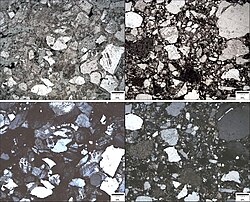Greywacke
Greywacke [1] is a type of sandstone. It is hard, and dark in color. It has different sized grains of quartz, feldspar, and small rock fragments set in a compact, fine clay matrix. It is mostly found in Palaeozoic strata. The larger grains can be sand-to-gravel-sized, and matrix materials make up more than 15% of the rock by volume.
The origin of greywacke was a problem. Gravel, sand and mud should not be laid down together, because river outflow drops heavier grains first. Now geologists think greywacke is formed by submarine avalanches or strong turbidity currents. These actions churn sediment and cause mixed-sediment slurries to occur. When this happens, the resulting rocks show various sedimentary features. Support for the turbidity current origin is the fact that deposits of greywacke are found on the edges of the continental shelves, at the bottoms of oceanic trenches, and at the bases of mountain formational areas. It also occurs in association with black shales of deep sea origin.
Greywacke Media
Photomicrographs of feldspathic (L) and lithic (R) greywacke. The top images are in plane-polarized light; the bottom images are in cross-polarized light. Cements fill the pore spaces.
Wall of greywacke at Möhne Reservoir dam, Germany



